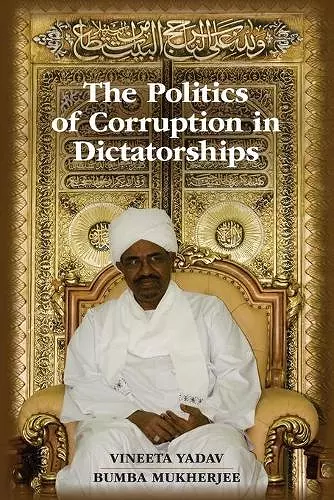The Politics of Corruption in Dictatorships
Vineeta Yadav author Bumba Mukherjee author
Format:Paperback
Publisher:Cambridge University Press
Published:30th Dec '15
Currently unavailable, and unfortunately no date known when it will be back
This paperback is available in another edition too:
- Hardback£60.00(9781107083233)

This book analyzes why some dictators find it in their self-interest to curb corruption.
This book provides senior undergraduates, graduate students, and scholars working in the areas of comparative politics, comparative political economy, economic development, business politics in emerging markets, and public policy with the first systematic theoretical study of corruption in dictatorships, using data and in-depth country studies from across the world.The Politics of Corruption in Dictatorships studies how institutional and social factors influence corruption in dictatorships. Dictatorships are often synonymous with high levels of corruption, yet Vineeta Yadav and Bumba Mukherjee argue otherwise. The authors ask why corruption has declined in some but not other authoritarian regimes. What are the main political factors that drive some autocrats to curb corruption? The book explores the role that business mobilization can play in reducing corruption under some conditions in dictatorships. It investigates how political competition for an elected legislature affects the incentives of dictators to engage in corruption. The study relies on case studies from Jordan, Malaysia, and Uganda. The book is accessible to a wide audience without requiring sophisticated statistical training.
'Authoritarian regimes have few obvious reasons to check corruption: political opposition can be suppressed, formal accountability is weak, and corruption can be profitable for those at the top. But through data analysis and case studies Yadav and Mukherjee argue that as many as half of all such regimes have apparently reduced corruption to meaningful degrees. The lessons of this fascinating analysis are important for both corruption control and how we understand authoritarian systems: reform need not await democratization, and anti-corruption opportunities can be found in unexpected places.' Michael Johnston, Charles A. Dana Professor of Political Science Emeritus, Colgate University, New York
'Vineeta Yadav and Bumba Mukherjee ask an important question: why are some autocracies more corrupt than others? After all, for every Singapore, there is a Zimbabwe or two. The authors argue that autocratic regimes reduce corruption when small business associations ally with opposition parties in the legislature to press the issue. To support their argument, they provide evidence from large-n cross-national analyses and cleverly designed case studies. Clearly argued and richly researched, The Politics of Corruption in Dictatorships deserves a wide audience.' Timothy Frye, Marshall D. Shulman Professor of Post-Soviet Foreign Policy, Columbia University, New York
'In The Politics of Corruption in Dictatorships, Vineeta Yadav and Bumba Mukherjee challenge the notion that authoritarian regimes are synonymous with high and unvaried levels of corruption. Yet, the authors explain, conditions promoting alliances between small and medium enterprises and elected opposition parties foster good governance in some authoritarian regimes and not others. Their work highlights bringing economic actors more centrally into the study of authoritarian institutions, making this book a valuable contribution for students of corruption and authoritarianism alike.' Ellen Lust, Founding Director, Programs on Governance and Local Development, University of Gothenburg and Yale University, Connecticut
'The Politics of Corruption in Dictatorships deserves a careful read by those seeking to reduce corruption in those states that are less than robust, Western-style democracies and from students of politics in authoritarian states.' Rick Messick, The Global Anticorruption Blog (www.globalanticorruptionblog.com)
'The authors challenge the widely accepted notion that dictatorships are synonymous with high levels of corruption, exploring why some autocratic regimes display high levels of corruption while others do not. Using case studies from Jordan, Malaysia and Uganda, they examine the political and economic factors that they believe disincentivise corruption.' Survival: Global Politics and Strategy
ISBN: 9781107443778
Dimensions: 229mm x 152mm x 108mm
Weight: 480g
323 pages